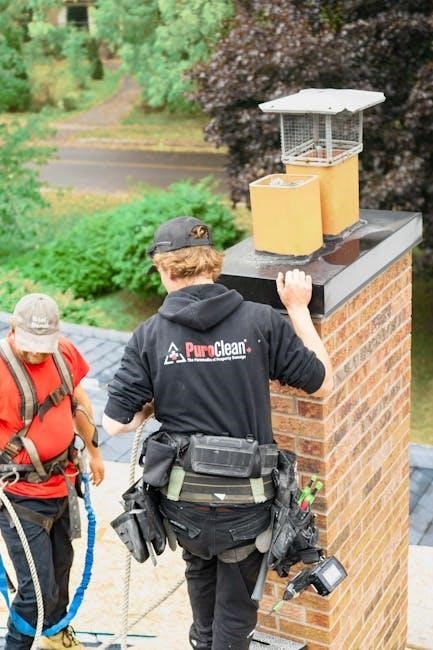Maintaining your 2018 Chevrolet Silverado is crucial for its longevity and performance. Regular servicing ensures reliability and prevents costly repairs. The owner’s manual provides a detailed schedule‚ guiding you through essential tasks to keep your truck in optimal condition.
1.1 Overview of the 2018 Chevrolet Silverado Maintenance Schedule
The 2018 Chevrolet Silverado maintenance schedule is a comprehensive guide designed to ensure optimal performance‚ reliability‚ and longevity. It outlines routine tasks and inspections tailored to the truck’s specific needs. Regular maintenance helps prevent mechanical issues‚ enhances fuel efficiency‚ and maintains the vehicle’s overall condition. By following the schedule‚ owners can avoid costly repairs and keep their Silverado running smoothly under various driving conditions.
1.2 Importance of Regular Maintenance
Regular maintenance is crucial for the 2018 Chevrolet Silverado to ensure reliability‚ performance‚ and safety. It prevents unexpected breakdowns‚ reduces repair costs‚ and extends the vehicle’s lifespan. Proper upkeep also maintains fuel efficiency‚ enhances driving comfort‚ and ensures critical systems function optimally. Following the recommended schedule helps protect the truck’s warranty and retains its resale value‚ making it a smart investment for long-term ownership. Consistency is key to maximizing your Silverado’s potential.
Engine Oil Change
Regular engine oil changes ensure smooth operation‚ prevent damage‚ and maintain performance. Synthetic oil is recommended for optimal protection in all driving conditions. Schedule consistency guarantees longevity and reliability.
2.1 Recommended Oil Change Frequency
The 2018 Chevrolet Silverado recommends an oil change every 5‚000 to 7‚500 miles‚ depending on driving conditions. For severe driving‚ such as frequent towing or extreme temperatures‚ the interval is reduced to 5‚000 miles. Synthetic oil is suggested for improved performance and longevity. Always consult the owner’s manual or the Oil Life Monitoring System for personalized recommendations to maintain optimal engine health and performance.
2.2 Engine Oil Life System
The 2018 Chevrolet Silverado features an Engine Oil Life System that monitors oil degradation based on driving conditions. This system calculates remaining oil life and alerts drivers when an oil change is needed. It considers factors like engine temperature‚ driving habits‚ and time since the last oil change. The dashboard displays the percentage of oil life remaining‚ ensuring timely maintenance and optimizing engine performance and longevity.
2.3 Choosing the Right Oil for Your Silverado
For the 2018 Chevrolet Silverado‚ it’s crucial to use the correct viscosity and type of oil to ensure optimal engine performance. The recommended oil is 0W-20 or 5W-20 synthetic or conventional oil‚ depending on driving conditions. Always refer to the owner’s manual or Chevrolet’s website for specific recommendations. Using the wrong oil can lead to reduced fuel efficiency and potential engine damage over time.
2.4 Resetting the Oil Life System
After changing the oil‚ reset the Oil Life System to maintain accurate tracking; Turn the ignition to the “ON” position without starting the engine. Navigate to the “Vehicle Information” menu using the steering wheel controls. Select “Oil Life” and follow the prompts to reset the system to 100%. This ensures the system provides reliable reminders for future oil changes.

Tire Maintenance
Regular tire checks ensure safety and performance. Inspect for wear‚ maintain proper inflation‚ and ensure balance and alignment for optimal vehicle handling and tire longevity.
3.1 Tire Rotation Recommendations
For the 2018 Chevrolet Silverado‚ tire rotation is recommended every 7‚500 to 8‚000 miles. Follow the pattern outlined in the owner’s manual to ensure even tread wear. Regular rotation improves traction‚ handling‚ and extends tire life. Neglecting this can lead to uneven wear‚ reducing tire longevity and potentially causing drivability issues. Always check tire pressure after rotation for optimal performance and safety.
3.2 Tire Pressure Checks
Regular tire pressure checks are essential for optimal performance and safety. For the 2018 Chevrolet Silverado‚ check pressure monthly and before long trips. Use the recommended PSI found on the tire information placard or owner’s manual. Under-inflation can reduce fuel efficiency and increase wear‚ while over-inflation may lead to reduced traction. Always check when tires are cold for accuracy. Maintain consistent pressure across all tires for balanced handling and durability.
3.3 Tire Inspection and Replacement
Inspect tires regularly for cracks‚ uneven wear‚ and punctures. Check tread depth using the penny test: insert a penny into the tread groove with Lincoln’s head down. If visible‚ tread is worn below 2/32″ and replacement is needed. Replace tires every 6 years or when worn‚ regardless of mileage. Consult the owner’s manual for specific guidelines to ensure safety and optimal performance.
3.4 Wheel Alignment
Wheel alignment should be checked every 12‚000 to 15‚000 miles or when signs like uneven tire wear or steering issues arise; Proper alignment improves fuel efficiency‚ reduces tire wear‚ and enhances handling. Misaligned wheels can cause vibration and pulling to one side. Have a certified technician adjust the camber‚ caster‚ and toe to factory specifications for optimal performance and longevity of your Silverado’s tires and suspension system.

Filter Maintenance
Regular inspection and replacement of air filters ensure optimal performance‚ fuel efficiency‚ and interior air quality. Follow the schedule outlined in your maintenance guide for best results.
4.1 Engine Air Filter Replacement
The engine air filter should be replaced every 15‚000 to 30‚000 miles or as indicated by the oil life system. A dirty filter can reduce fuel efficiency and performance. Always use a high-quality filter designed for your Silverado to ensure proper engine function. Refer to your owner’s manual or maintenance schedule for specific guidelines and recommendations.
4.2 Passenger Compartment Air Filter Replacement
The passenger compartment air filter should be replaced every 15‚000 to 30‚000 miles to maintain air quality inside the vehicle. It helps reduce allergens‚ dust‚ and odors. Replacement is recommended during regular maintenance to ensure optimal performance of the heating and cooling system. Always use a filter designed for your Silverado and consult the owner’s manual for specific guidelines.
4.3 Resetting the Engine Air Filter Life System
After replacing the engine air filter‚ reset the life system to ensure accurate monitoring. Turn the ignition to the “ON” position‚ navigate to the “Settings” menu‚ and select “Vehicle Info.” Choose “Engine Oil Life” and follow prompts to reset the filter life system. This step ensures the system accurately tracks the new filter’s condition. Refer to the owner’s manual for detailed instructions.

Air Conditioning Desiccant Replacement
The desiccant in your Silverado’s AC system should be replaced every 6-8 years or when moisture-related issues arise. A trained technician can perform this service.
5.1 Scheduled Replacement Interval
The desiccant in the 2018 Chevrolet Silverado’s air conditioning system should be replaced every 6 to 8 years‚ depending on usage and environmental conditions. If moisture-related issues arise‚ such as reduced cooling performance or fogging‚ replacement may be needed sooner. Always consult a certified technician for accurate scheduling and installation to maintain optimal AC performance and prevent system damage.
5.2 Importance of Desiccant Maintenance
Regular desiccant maintenance is crucial for the 2018 Chevrolet Silverado’s air conditioning system. The desiccant absorbs moisture‚ preventing mold growth and bacterial odors. A failed desiccant can lead to reduced cooling performance and potential system damage‚ such as corroded lines or compressor failure. Replacing it as scheduled ensures optimal AC functionality‚ prevents costly repairs‚ and maintains cabin comfort during driving.
Transmission and Drivetrain Service
Regular transmission and drivetrain service involves checking fluid levels and condition‚ ensuring proper lubrication‚ and inspecting for leaks or wear. This maintains smooth power delivery and prevents costly repairs.
6.1 Transmission Fluid Check and Change
The 2018 Chevrolet Silverado requires regular transmission fluid checks to ensure optimal performance. The fluid level should be inspected every 30‚000 miles or as indicated by the vehicle’s maintenance schedule. Locate the transmission pan‚ remove the dipstick‚ and check the fluid level. The fluid should be clear and amber-colored; if it’s dark or has a burnt smell‚ it’s time for a change. Use the recommended Dexron VI fluid and refer to the owner’s manual for proper procedures. Always tighten the pan bolts securely with a torque wrench to avoid leaks. Regular fluid changes prevent transmission damage and ensure smooth gear shifting. Neglecting this can lead to costly repairs‚ so it’s important to stay on schedule. Always consult a certified technician if unsure about the process.
6.2 Drivetrain Inspection
Inspect the drivetrain every 30‚000 miles to ensure proper function. Check the universal joints‚ driveshaft‚ and CV boots for signs of wear or damage. Lubricate u-joints as needed. Inspect axles and seals for leaks or damage. Replace any worn or damaged components promptly. Neglecting drivetrain maintenance can lead to vibrations‚ reduced performance‚ or costly repairs. Always consult a certified technician for a detailed inspection and recommendations.
Brake System Maintenance
Regular brake system checks are essential for safety. Inspect pads‚ rotors‚ and fluid levels every 12‚500 miles. Replace worn components promptly to maintain optimal braking performance.
7.1 Brake Pad Inspection and Replacement
The 2018 Chevrolet Silverado requires brake pad inspection every 12‚500 miles. Look for wear indicators like squealing noises or spongy brake feel. Pads should be replaced when thickness reaches 1/8 inch or less. Proper replacement ensures safe stopping power and prevents rotor damage. Always use OEM or equivalent pads for optimal performance and reliability.
7.2 Brake Fluid Check and Change
The 2018 Chevrolet Silverado requires brake fluid checks every 12‚500 miles. Inspect the fluid level and condition‚ ensuring it meets DOT 3 specifications. Change the fluid every 30‚000 miles or if contaminated. Low levels or dirty fluid can compromise braking performance. Always use the recommended brake fluid type to maintain system integrity and ensure safe operation.
7.3 Brake Rotor Inspection
Inspect the brake rotors every 12‚500 miles. Look for excessive wear‚ scoring‚ or warping. Check the rotor thickness using a micrometer; replace if below the minimum specification. Ensure the rotor surface is free from rust and debris. Regular inspections prevent brake failure and ensure optimal performance. Replace worn or damaged rotors promptly to maintain safe braking efficiency.

Cooling System Maintenance
Regular cooling system checks ensure optimal engine performance. Inspect hoses‚ belts‚ and the radiator for leaks or damage. Maintain proper coolant levels and condition.
8.1 Coolant Level Check
Check the coolant level regularly to prevent engine overheating. Locate the coolant reservoir and ensure the level is between the minimum and maximum marks. Always check when the engine is cold. If the level is low‚ add a 50/50 mix of DEX-COOL coolant and water. Inspect for leaks or contamination. Proper coolant levels maintain engine temperature and prevent damage. Follow the recommended schedule for best results.
8.2 Coolant Flush and Replacement
The coolant in your 2018 Chevrolet Silverado should be flushed and replaced every 5 years or 150‚000 miles. Use DEX-COOL coolant to prevent corrosion and maintain optimal cooling efficiency. Drain the old coolant‚ flush the system thoroughly‚ and refill with the recommended mixture. This ensures proper engine temperature regulation and prevents overheating issues. Always follow the manufacturer’s guidelines for best performance.
8.3 Hose and Belt Inspection
Inspect the coolant hoses for cracks‚ leaks‚ or soft spots every 15‚000 to 30‚000 miles. Check the serpentine belt for cracks‚ frays‚ or uneven wear. Replace any damaged belts or hoses promptly to avoid engine damage. Ensure proper tension on belts to maintain optimal performance. Regular inspections prevent unexpected breakdowns and maintain your Silverado’s reliability and efficiency on the road.

Battery Maintenance
Regular battery maintenance ensures reliable starting and electrical system performance. Inspect terminals for corrosion‚ check charge levels‚ and follow replacement guidelines to maintain optimal function.
9.1 Battery Terminal Inspection
Inspect the battery terminals every 6 months to ensure clean‚ tight connections. Remove any corrosion using a wire brush and baking soda solution. Tighten all connections securely. Corrosion and loose connections can lead to electrical system malfunctions and starting issues. Regular inspections help maintain optimal battery performance and prevent unexpected breakdowns.
9.2 Battery Charge Check
Check the battery charge level every 6 months or as needed. Use a multimeter to measure voltage‚ ensuring it reads between 12.4V and 12.7V for a fully charged battery. Look for signs of a weak battery‚ such as slow engine crank or dim lights. A low charge can lead to breakdowns‚ especially in extreme temperatures. Testing the charge ensures reliable starting power and prevents unexpected failures.
9.3 Battery Replacement Guidelines
Replace the battery every 5-7 years or when showing signs of weakness. Choose an AGM battery compatible with the 2018 Silverado’s electrical system. Ensure the new battery has the same or higher CCA rating. Disconnect the negative terminal first during installation. Properly dispose of the old battery at an authorized recycling center. Consult a certified technician if unsure about the process to avoid electrical system damage.

Steering and Suspension
Regular checks ensure stability and control. Inspect power steering fluid levels‚ look for leaks‚ and worn components like shocks and ball joints. Professional inspections maintain optimal performance and safety on the road.
10.1 Power Steering Fluid Check
The 2018 Silverado requires regular power steering fluid checks to ensure smooth steering operation. Locate the reservoir‚ typically on the driver’s side‚ and inspect the level with the engine running. Check for leaks around the reservoir and hoses. If the fluid is low or contaminated‚ top it off with the recommended fluid type. Replace the fluid every 30‚000 to 60‚000 miles to maintain system performance and prevent damage. Always consult the owner’s manual for specific guidelines.
10.2 Suspension Inspection
Inspect the Silverado’s suspension system regularly to ensure optimal performance and safety. Check shocks‚ struts‚ and springs for signs of wear or damage. Look for loose or worn-out components like ball joints and bushings. Ensure proper alignment of wheels and axles. Address any issues promptly to maintain ride quality and handling. Schedule inspections every 12‚000 miles or as needed based on driving conditions. Always follow manufacturer guidelines for repairs.

Exhaust System Check
Inspect the exhaust system for leaks‚ damage‚ or wear. Check the muffler‚ catalytic converter‚ and tailpipe. Look for signs of corrosion or loose connections. Address issues promptly to maintain performance and reduce emissions. Schedule inspections based on mileage or noticeable problems like rattling noises or decreased fuel efficiency. Ensure repairs follow manufacturer recommendations.
11.1 Inspection of Exhaust Components
Inspect the muffler‚ catalytic converter‚ exhaust pipes‚ and connections for damage‚ leaks‚ or corrosion. Check for loose parts or rust. Ensure all components are securely fastened. Look for signs of wear like dents or holes. Test for leaks by listening for unusual noises during acceleration. Address any issues promptly to prevent reduced performance or emissions problems. Schedule inspections as part of routine maintenance to maintain optimal functionality and safety.
11.2 Signs of Exhaust System Issues
Look for loud rumbling or hissing noises‚ which may indicate leaks or damage. Decreased performance‚ such as reduced power or acceleration‚ could signal exhaust system problems. Check for visible rust‚ dents‚ or holes in components. A decrease in fuel efficiency or unusual vibrations may also be signs of issues. Address these symptoms promptly to avoid further damage and maintain your Silverado’s performance and reliability.

Underbody Inspection
Inspect the underbody for damage‚ rust‚ or leaks. Check frame‚ axles‚ and suspension components. Look for worn or loose parts. Ensure drivetrain integrity. Schedule every 12‚000–15‚000 miles.
12.1 Frequency of Underbody Checks
The underbody of your 2018 Chevrolet Silverado should be inspected every 12‚000 to 15‚000 miles. In harsh conditions‚ like high-salt areas‚ check every 7‚500 to 10‚000 miles. Look for rust‚ damage‚ or leaks. Regular inspections prevent corrosion and ensure structural integrity. Adhering to these intervals keeps your Silverado in optimal condition.
12.2 Components to Inspect
During underbody inspections‚ focus on the frame‚ axles‚ suspension components‚ and exhaust system. Check for rust‚ dents‚ or damage. Inspect the fuel tank and lines for leaks or corrosion. Examine brake lines‚ hoses‚ and wiring for wear or damage. Ensure all mounting points are secure. Look for signs of excessive wear on steering and drivetrain components; Addressing issues early prevents costly repairs and ensures safety.
Wiper Blades and Windshield Maintenance
Regularly inspect wiper blades for wear and replace every 6-12 months. Clean the windshield and check washer fluid levels. Ensure proper visibility for safe driving.

13.1 Wiper Blade Replacement
Replace wiper blades every 6-12 months or when showing signs of wear‚ such as streaking or chattering. Inspect blades for cracks‚ torn rubber‚ or bent frames. Use the owner’s manual to find the correct replacement blades for your Silverado. Properly functioning wipers are essential for visibility during rain or snow. Upgrade to high-quality blades for improved performance in harsh weather conditions. Always test wipers after replacement to ensure optimal functionality.
13.2 Windshield Washer Fluid Check
Check the windshield washer fluid level regularly and refill as needed. Use a high-quality washer fluid designed for your climate to prevent freezing or overheating. Inspect the washer nozzles for blockages and clean them if necessary. Replace cracked or damaged nozzles to ensure proper spray patterns. Maintain proper visibility by keeping the reservoir filled‚ especially before long trips or seasonal changes. Follow the owner’s manual for recommended fluid types.
13.3 Windshield Inspection
Inspect the windshield for cracks‚ chips‚ or scratches that could impair visibility. Check for damage in the driver’s line of sight‚ as this may require immediate attention. Clean the windshield regularly using a glass cleaner and a microfiber cloth to avoid streaks. Replace the windshield if damage spreads or obstructs vision. Address minor chips promptly to prevent them from growing. Ensure proper visibility for safe driving conditions.
Regular maintenance is essential for extending the life and performance of your 2018 Chevrolet Silverado. By following the recommended schedule‚ you ensure optimal functionality‚ safety‚ and reliability. Addressing issues early prevents costly repairs and enhances overall driving experience. Stay proactive with routine checks and replacements to keep your Silverado in peak condition for years to come. Proper care ensures long-term durability and maintains its value effectively.